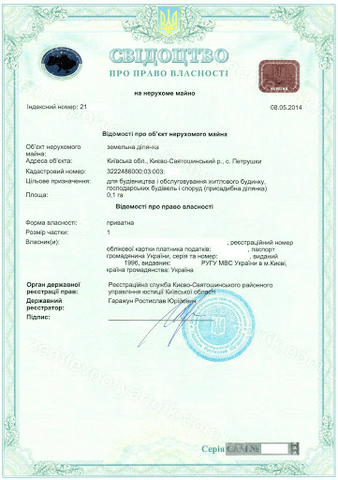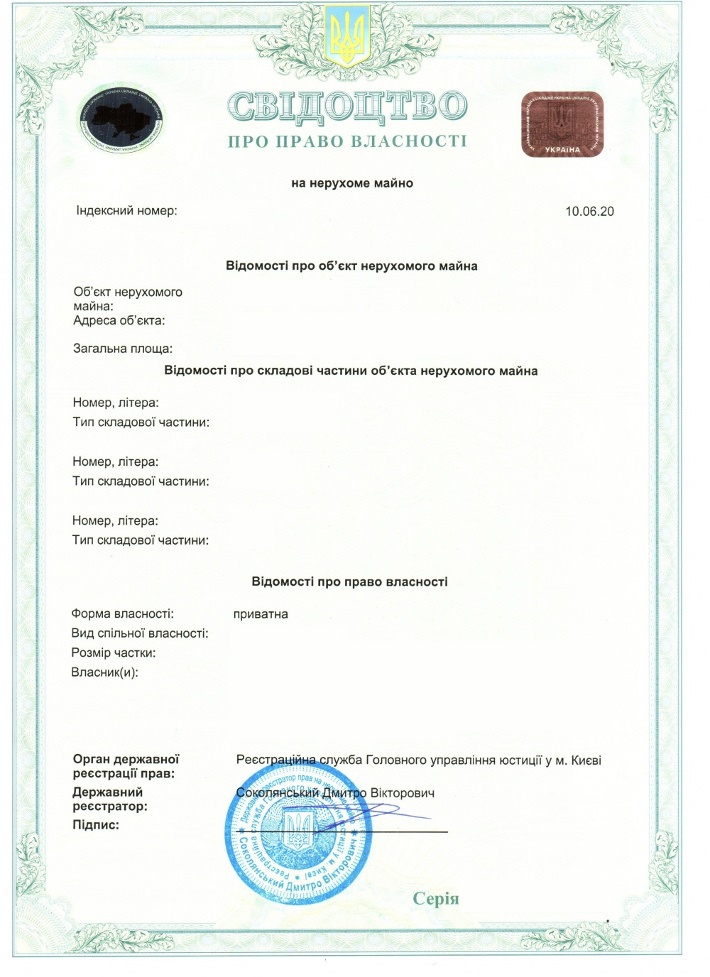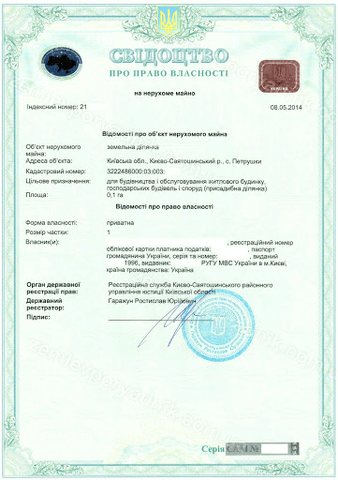Legal support of transactions with land plots in Ukraine in 2023
Cost of services:
Reviews of our Clients
Performing a legal audit before purchasing a piece of land is essential to avoid any unpleasant surprises in the future. Buying land involves a complex process and a significant investment, so it's crucial to ensure a high-quality audit.
Today, we will delve into what you need to know about a land plot before acquiring it, what pitfalls to avoid, and the specific procedures for buying or selling land in Ukraine. Additionally, we'll explore the taxation aspects related to land acquisition and sale.
If you're interested in a secure land acquisition process in Ukraine, don't hesitate to seek assistance and advice from our team of experts.
You may also like: How to Register Agricultural Land Use Rights During War Times?
Major red flags during the land plot audit
Here are some major red flags that arise during the legal audit of a land plot:
Outdated or unregistered ownership documents. This occurs when the property rights documentation from the past is questionable due to the ease of forgery. During the audit, it's important to thoroughly examine the legislation that governed the establishment and registration of property rights at that time. This is particularly crucial during periods when a new state act was required for property transfers or when someone sold a land plot but retained the original state act. Essentially, there may be an ownership document, but the actual property right is missing.
Discrepancies between land cadastre data and ownership documents (area, location, configuration, or overlaps). It's vital to have a clear understanding of what you're acquiring, its precise location, and whether there are any boundary disputes with neighboring properties. All details in the documents should align with the information in the land cadastre records.
Incompatible land designation with the buyer's intended use. The designated purpose of the land should match the buyer's intended future use. If the plot seems attractive from an investment standpoint but doesn't align with the buyer's intended purposes, it's advisable to explore the possibility of changing the land's designation even before the acquisition takes place.
Unfortunately, this isn't always feasible, even if a realtor or seller claims that anything is possible, such as converting a forest land plot for construction purposes.
Government authorities, local self-governing bodies, and the prosecutor's office can quickly reclaim such plots, returning them to state or communal ownership.
Changes discovered in the configuration, subdivision, or merging of land plots during the examination of the archival records. Such modifications could indicate an attempt to conceal the original plot, including its cadastral number, in order to prevent its return to the previous owner.
It’s important to verify the transferability of agricultural land plots to legal entities, specifically plots that were physically allocated to owners of land shares for personal peasant farming, it is important to verify their transferability. If the supporting documents do not explicitly state that the plot for personal peasant farming was allocated from land shares, it is necessary to seek information from the land resource departments and relevant local authorities to confirm its transferability.
You may also like: Change of Land Use Designation in 2023
Common methods of transferring ownership of a land plot
- sale and purchase agreement;
- donation;
- a land plot exchange;
- mortgage or collateralization;
- inheritance agreement;
- life estate agreement;
- trust ownership of the land plot;
- contribution to the capital of an LLC, etc.
When choosing a specific method, several factors are considered, including:
- The characteristics of the land plot, its designated purpose, and compliance with legal requirements for transferability.
- The parties involved in the transaction and the legal obligations imposed on them (e.g., verifying the buyer and their spouse for ownership of agricultural land plots up to 00 hectares).
- The payment methods and procedures between the parties (typically non-cash transactions for agricultural land).
- The specific taxation rules and regulations related to land plots in a particular country or region.
You may also like: How to Verify a Land Plot in Ukraine Before Purchase?
Taxation of land agreements in Ukraine
Generally, all taxes are determined and paid prior to the completion of a land transfer agreement. If the agreement is not finalized, the taxes paid are refunded.
The tax amount is influenced by several key factors:
- Type of agreement being entered into.
- Status of the parties involved (such as kinship for gift agreements or non-resident status for Ukrainian citizens).
- Taxable base (normative assessment, expert assessment, or book value).
- Duration of the property's ownership by the seller.
When entering into a land purchase agreement, it is generally required to pay taxes amounting to a total of 8.5% based on the agreed price:
- 5%: Personal Income Tax
- 1.5%: Military fee
- 1%: State duty
- 1%: Pension contribution.
The legislation provides for certain cases where individuals can be exempted from paying government fees, military fees, or have a 0% Personal Income Tax rate applied.
When assisting clients with their transactions, choosing an advantageous tax treatment can lead to significant cost savings. In our practice, we have successfully refunded clients the pension contribution they paid when acquiring a land plot.
To illustrate how this works, let's consider a scenario where non-relatives are gifting a land plot.
In the case of a gift, the recipient is responsible for paying income tax on the received gift. In a sale transaction, the seller bears the tax burden. However, if the seller has owned the property for more than 3 years, the standard 5% personal income tax rate that applies to sale-purchase agreements is not applicable. In this situation, it is economically beneficial to choose a sale-purchase agreement instead of a gift.
Additionally, when drafting a gift agreement between relatives of the 1st and 2nd degree (such as parents, children, spouses, siblings, grandparents, and grandchildren), there is no requirement to pay a personal income tax or a military fee
You may also like: How to Properly Buy a Plot of Land for Construction in Ukraine?
Moratorium and methods of alienating agricultural lands
The most common way to bypass the agricultural land moratorium before 2021, despite the prohibition on selling restricted agricultural lands, was through long-term lease agreements (or emphyteusis) that included a provision granting the lessee the first right to purchase or transfer ownership once the moratorium was lifted.
However, this approach never guaranteed the lessee an unconditional and absolute right to acquire ownership. The previous owner had already received payment for the land without transferring full ownership rights. These agreements were often supported by a power of attorney and a will.
Over the 20 years of the moratorium, this strategy had been employed by various parties, including prosecutors, courts, and law enforcement agencies. Consequently, if someone acquired land using this method, there was a significant risk of losing ownership rights if the previous owner decided to reclaim the land.
Therefore, when conducting an audit of agricultural land, we:
- Thoroughly examine the basis for obtaining ownership rights and provide general recommendations to our clients regarding the risks associated with acquiring such property.
- Develop robust safeguards for the buyer to minimize potential issues in the future.
For example, we have developed a purchase agreement with penalty provisions for the seller in case of legal challenges from the seller or any interested party. We have also included conditions for refunding the paid amount.
Currently, there is only a partial lifting of the moratorium on the sale of agricultural lands. It still applies to certain individuals and under specific conditions. For instance:
- Legal entities are currently prohibited from acquiring agricultural land plots until January 1, 2024. This restriction applies to various types of land, including land shares and privately-owned plots designated for commercial agricultural activities, as well as plots specifically allocated for individual peasant farming.
- Owners of land shares or plots situated in temporarily occupied territories, such as Donetsk and Luhansk regions, the Autonomous Republic of Crimea, and the city of Sevastopol, face a complete prohibition on selling their land except through inheritance.
- Banks, however, have permission to acquire ownership rights to agricultural land through foreclosure proceedings when the land is used as collateral. In such cases, the banks are required to sell the land at public auctions within two years of obtaining ownership rights.
- It is important to note that acquiring ownership rights to agricultural land for farming purposes through paid agreements is strictly regulated. If the buyer cannot provide proper documentation confirming the legitimate origin of the funds or assets used for the purchase, they are not allowed to obtain ownership rights.
The moratorium applies to specific types of agricultural land and certain individuals, and in some cases, it remains in effect until a referendum is conducted regarding foreign ownership of land in Ukraine.
In the past three years, parties have had the freedom to choose how they transfer agricultural plots, but they must comply with the requirements outlined in both civil and land legislation.
Recent changes in the law have simplified the process of acquiring ownership rights for agricultural land, specifically for plots intended for gardening (up to 0.25 hectares) or private household farming (up to 2 hectares) within populated areas.
For example, previously, when buying a country house plot near Kyiv, because it was classified as agricultural land, the buyer had to go through a specific check:
- They had to confirm that they didn't own agricultural land larger than 100 hectares.
- They had to provide proof of their official income sources to demonstrate their eligibility for acquiring gardening plots.
In other words, both regular citizens and farmers were subject to the same scrutiny when purchasing these plots. However, such verification is no longer required.
If you're looking for a reliable and secure way to buy or sell a land plot in Ukraine, we're here to assist you. Our team offers a range of services:
- A thorough audit of the land plot, its ownership, and history, taking into account your specific land use goals.
- Expert consultations and valuable recommendations tailored to your needs.
- Obtaining the necessary legal documents for the land plot.
- Organizing the entire land transaction, ensuring a smooth and efficient experience.
- Guidance on taxation agreements and address any related inquiries.
See the pricing details on land plot assessments here.
To learn more about the cost of transaction support for land and real estate, click here.
Our clients







